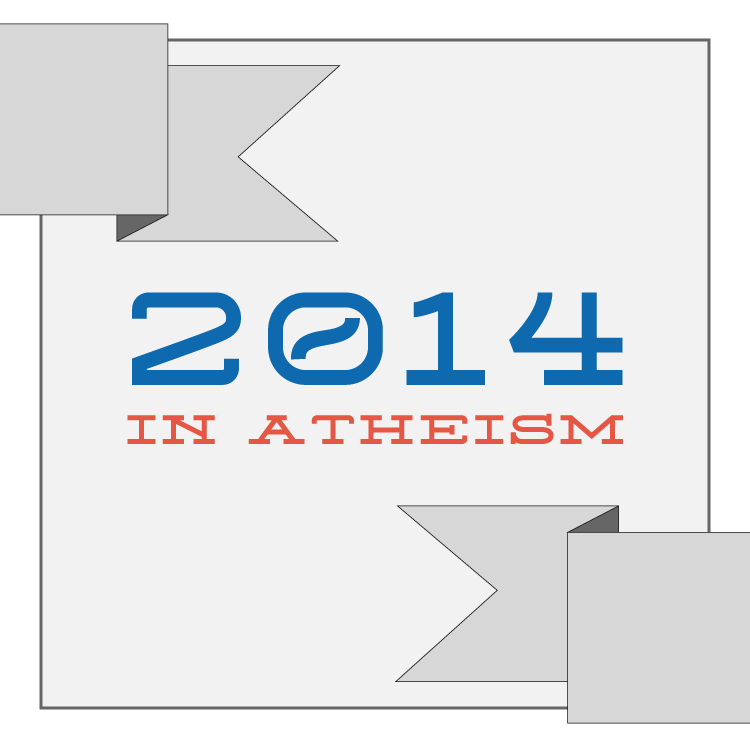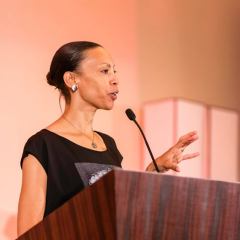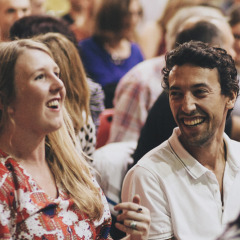2014 was a dynamic year for atheists and agnostics. From the popularity of ‘Cosmos’ on Fox-TV to the Roku launch of ‘Atheist TV’, from open atheist James Woods’s inspiring congressional campaign to Richard Dawkins’s less-than-inspiring Tweets, nontheists made headlines all year.
The stories listed above are just the beginning. So to highlight some of atheism’s defining moments in 2014, I’ve once again invited a panel of writers, scholars, and activists to submit 14 major moments or currents in American atheism from the last year. Of course, this list isn’t exhaustive—I hope you’ll add to it in the comments.
Atheist spirituality hits the bestseller list

Sam Harris. Photo courtesy Wikimedia Commons.
In 2014, two prominent atheists wrote bestselling books describing profound “spiritual” experiences. Barbara Ehrenreich’s Living With a Wild God and Sam Harris’s Waking Up take a naturalistic approach to experiences that have historically been interpreted as religious. Both books successfully make the case that spiritual-type experiences—also called peak experiences and self-transcendent experiences—can mark positively transformative moments in the lives of believers and nonbelievers alike. They each call for more scientific research to investigate the psychology and neuroscience of “spiritual” experiences like their own. —David Bryce Yaden, Humanist Chaplain at Rutgers University and researcher | @ExistWell
Greece v. Galloway inspires surge of Humanist invocations
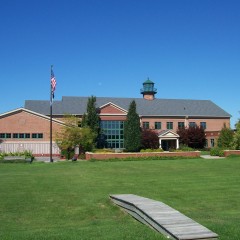
Town Hall in Greece, N.Y. Photo courtesy of Wikimedia Commons.
On May 5, the Supreme Court decided in Town of Greece v. Galloway that the town’s practice of beginning legislative sessions with prayers does not violate the Establishment Clause of the First Amendment—so long as the town does not discriminate against minority traditions in determining who can offer a prayer. In response, some governmental bodies have sought to exclude the nonreligious from delivering invocations (in violation of the Court’s ruling). But the ruling also inspired nonreligious individuals across the U.S. to take initiative and seek to offer invocations at governmental meetings. Secular invocations have now been delivered in Alabama, Arizona, Florida, Illinois, South Dakota, and— you guessed it—even the Town of Greece. These invocations may not influence policymaking, but they do send the message that nonreligious individuals are part of the fabric of American communities, just like their religious neighbors. —Michael De Dora, President of the United Nations NGO Committee on Freedom of Religion or Belief and Director of the Center for Inquiry Office of Public Policy | @mdedora
First-of-its-kind conference lifts up the perspectives of atheists of color
In October of this year, the People of Color Beyond Faith network and Black Skeptics Group organized the first annual “Moving Social Justice” conference at the Center for Inquiry, Los Angeles. Responding to the failure of mainstream atheist and Humanist organizations to address racial, gender and economic inequality, the event was the first conference to foreground social justice from the perspective of nonbelievers of color. The conference featured panel discussions on race, intersectionality and the myth of colorblindness in atheism, prison pipelining and youth leadership, feminism(s) of color, confronting homophobia and transphobia in the Black Church, and the perspectives of LGBTQ atheists of color. Activists, educators and authors from the secular humanist, atheist, and faith communities participated. The next MSJ conference will be held at Rice University in 2015. —Sikivu Hutchinson, author and Founder of the Black Skeptics Group | @sikivuhutch
Danielle Muscato builds transgender visibility among atheists

The American Atheists logo. Image via Wikimedia Commons.
This year Danielle Muscato, Public Relations Director at American Atheists, came out publicly as a transgender woman. It was undoubtedly a difficult decision given her position. When I began working professionally in the organized secular movement in 2011, I had no other visible transgender leaders to look to as a role model. Yet Danielle is now building positive visibility for the transgender community, both inside and outside the secular movement, at a critical moment in history. 2014 witnessed an incredible outpouring of positive media coverage of transgender issues, including a Time magazine that declared we are now at the “Transgender Tipping Point.” Yet there is still much work to be done to create a society where everyone has the freedom to be themselves—and I am proud to work alongside Danielle in building it. —Kayley Whalen, Digital Strategies and Social Media Manager at the National LGBTQ Task Force | @LenoreGore
Atheist issues advance in the U.S. military

Atheist dog tags. Photo courtesy user “darwin.wins” via Flickr Creative Commons.
2014 saw a wider realization of the U.S. military as the culture war battleground it’s always been. Congress itself held a hearing on the issue of military religious freedom, approved a land transfer to bring a war memorial in line with the Constitution, and took up legislation to guarantee comprehensive reproductive health coverage for women servicemembers and dependents. The Air Force backed down from requiring “so help me god” in its enlistment oath, and the Army was forced to remove a “Christians only” ROTC job listing. A lawsuit was filed to try and create the first humanist chaplain, and the Navy approved the military’s first atheist lay leader. Finally, in a detailed report, Americans United for Separation of Church and State demolished Religious Right claims of military “religious discrimination.” —Ed Beck, Policy Analyst at Center for Inquiry Office of Public Policy | @DEdwardBeck
Latin@ ‘nones’ step into the spotlight
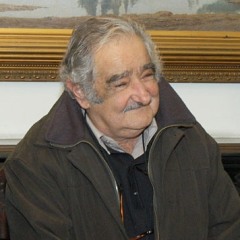
Uruguayan president José Mujica, an atheist, drew comparisons to Pope Francis in 2014. Photo via Wikimedia Commons.
The election of Pope Francis, the first pontiff hailing from Latin America, has not slowed the rise of secularism at the expense of Catholicism among Americans with Latin roots. In the United States a Pew poll confirmed earlier findings by the Institute for the Study of Secularism in Society & Culture and Public Religion Research Institute about the growing number of Latinos becoming religious nones. Today, about 1-in-5 Latinos are nones according to Pew and PRRI’s American Values Atlas. In Latin America, surveys by Latinobarometro and Pew also found increasing number of nones, particularly in South American countries like Uruguay. As their numbers grow, we should be sure to listen to the distinct voices of Latino nones. —Juhem Navarro-Rivera, Research Associate at the Institute for the Study of Secularism in Society & Culture | @juhemnr
Bill Maher and Sam Harris spark debates about Islam
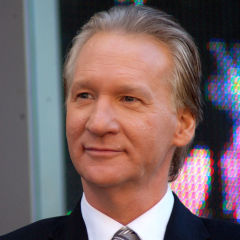
Bill Maher. Photo courtesy Angela George, via Wikimedia Commons.
Sam Harris and Bill Maher, two of the world’s most famous atheists, made large claims about Islam this year—arguing that the doctrines of Islam are inherently violent and that they specifically lead to ISIS’s brand of violence. Widespread debates ensued about the inherent violence of Islam, who speaks for Muslims, bigotry amongst atheists, religious tolerance, and all forms of fundamentalism—from Islamic fundamentalism to atheistic fundamentalism. But the question this atheist is left with is what type of atheist does she want to be? An anti-theist? A faitheist? Or something else? I hope to see more of us discuss that in 2015. —Vanessa Zoltan, Assistant Humanist Chaplain at Harvard University
From Ferguson to climate change, Humanists tackle vital justice issues

Protestors in Ferguson, MO on August 15, 2014, holding up a Stolen Lives Project banner listing people killed by police officers. Photo by user “Loavesofbread” via Wikimedia Commons.
Though American atheism and Humanism continue to face major barriers to accessibility, 2014 saw more communities and individuals embracing social action as a way of living out their values. In an interview last April, scholar Anthony Pinn remarked: “For humanists a full range of social concerns ought to mark our efforts: anything related to the flourishing of life should be within our wheelhouse.” Some have taken this to heart: Atheist activists were a part of the historic People’s Climate March in NYC in September, and Ethical Society leaders in St. Louis have been involved in organizing against white supremacy and police brutality since the killing of Michael Brown in August. There is still a great deal of work to do to mobilize American atheism and Humanism towards the pressing social concerns of our time—but as more and more local activists put themselves on the line in resistance, we can hope the organized movement will follow suit. —Walker Bristol, Humanist in Residence at Tufts University and Master of Divinity candidate at Harvard Divinity School
Humanist resources expand in higher education

The University of Southern California Viterbi School of Engineering. Photo taken by Lan56, via Wikimedia Commons.
2014 was a landmark year for the formation and development of Humanist communities in American higher education. A student-led campaign resulted in the formation of a Humanist in Residence position at Tufts University, the first fully university-funded position of its kind. My own community, the Yale Humanist Community, dramatically increased its programming—including implementing Connecticut’s first weekly SMART Recovery program. The University of Southern California began offering nontheistic pastoral care and promoting student community service through its brand new Humanist Chaplaincy. Though there are still less than a dozen such programs, Humanist resources in higher education are expanding—aiding nonreligious students as they grow and engage with their communities. —Stephen Goeman, Master of Divinity candidate at Yale Divinity School | @StephenChanges
The study of atheism and secularity reaches new heights

The “nones” are on the rise. Photo courtesy Colt Maverick, via Flickr Creative Commons.
Last year we noted the increasing scholarly attention atheism and secularity was garnering, and this trend continued into 2014. The event that best exemplifies this was the 2014 conference for the Society for the Scientific Study of Religion. This annual gathering of psychologists, sociologists, religious study scholars, and others boasted more sessions on atheism and secularity than ever before. The journal Secularism & Nonreligion hosted a panel featuring papers by Cragun and Fazzino on secular group “fractures” and Silver’s “six types of nonbelief.” Gervais presented on perceptions of atheists as “intuitively immoral,” Edgell and Stewart presented a follow up to Edgell’s 2006 work on “atheists as others,” and Chaves and Voas presented data showing that the United States is not an exception to the general trend of secularization in the West. Last year we noted that in 2013 “atheism was more studied, and better understood, than ever before.” It was exciting to see that continue—and expand—in 2014. —Marcus Mann, PhD student in Sociology at Duke University & Thomas J. Coleman III, Graduate student at The University of Tennessee at Chattanooga | @MannMarcus & @NonBeliefStudy
Humanists challenge exclusionary Pledge
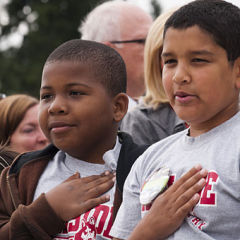
Children recite the Pledge of Allegiance at Joint Base Lewis-McChord, Wash., July 30, 2012. Photo by Staff Sgt. Bernardo Fuller, via Wikimedia Commons.
With the start of the school year, the American Humanist Association launched its Boycott the Pledge Campaign—asking everyone to stand up for the rights of nontheists by sitting out the Pledge until it’s fixed. The boycott is using education to shift the demographics of those who would unthinkingly oppose atheist equality. Students, teachers and administrators alike are learning that participation in the Pledge can’t be coerced. Over a dozen schools required prompting from the AHA’s lawyers to do the right thing, but justice was served in every case, and media coverage of these lapses just added to the education. —Roy Speckhardt, Executive Director of American Humanist Association | @royspeckhardt
Raif Badawi shines a light on international religious freedom efforts
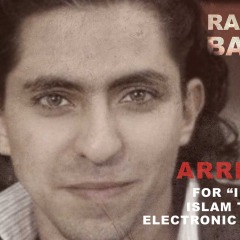
Raif Badawi, via Center for Inquiry.
In May, a Saudi court sentenced activist Raif Badawi to 100 lashes and ten years in prison. Every Friday after weekly prayers, Badawi is removed from his cell, publicly lashed, and then returned to prison. His crime: He started a Facebook page called the Liberal Saudi Network, and in the process, ran afoul of the country’s religious police. He narrowly avoided a charge of apostasy, which carries the death penalty. His case is extreme, but not unusual. Belief minorities, including (and sometimes especially) nontheists suffered numerous human rights violations this year, and there’s no sign that’s about to change. The International Humanist and Ethical Union reports that 19 countries enforce laws against apostasy and in 12 of those countries, it’s punishable by death. Freedom of belief made headlines this year because of Badawi and other activists. It should next year, too. —Sarah Jones, Communications Associate for Americans United for Separation of Church and State | @onesarahjones
A wider range of atheist voices show that atheism is more than anti-theism
Only one in seven nonbelievers is anti-religious. Though this finding has been publicly available since 2012, it wasn’t until this year that a large number of people seemed to notice—with references here at RNS and by Reza Aslan at Salon, for example. And there’s reason to think that even this estimate is too high, since the participants were recruited through existing atheist channels like blogs and freethought groups, which would naturally be skewed against those with less hardline views. In 2014, it became clearer than ever that there is a radical discrepancy between the views of most atheists and the voices taken to publicly represent them—thanks in large part to the increasing diversity of voices speaking out. —Vlad Chituc, Editor of NonProphet Status and researcher | @VladChituc
Humanists take a big step into global service
In 2014, a team of Humanist volunteers returned from a year working on education, human rights, and public health projects in eight countries around the world. It was the crucial first step toward an international Humanist Service Corps, scheduled to launch its first long-term project next year in the witch camps of northern Ghana. —Dale McGowan, author and Executive Director of Foundation Beyond Belief | @InFaithandDoubt
What do you think some of atheism’s defining moments or trends were in 2014? Did the panelists miss anything? Do you agree with their choices? Do you have any predictions for atheism in 2015? Let us know in the comments!
